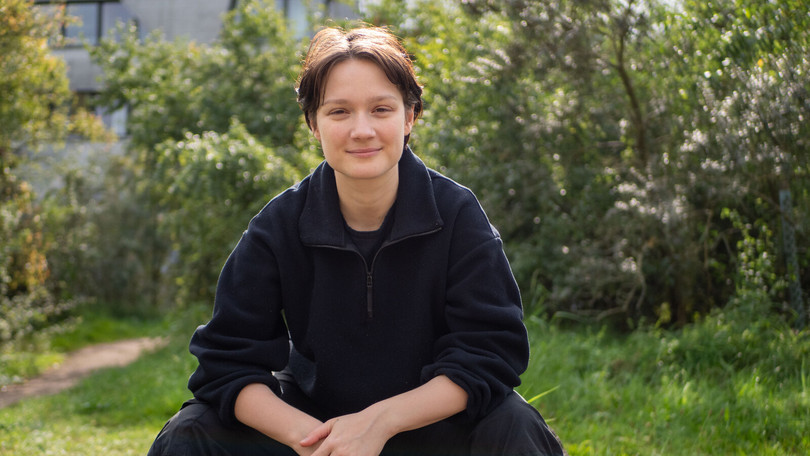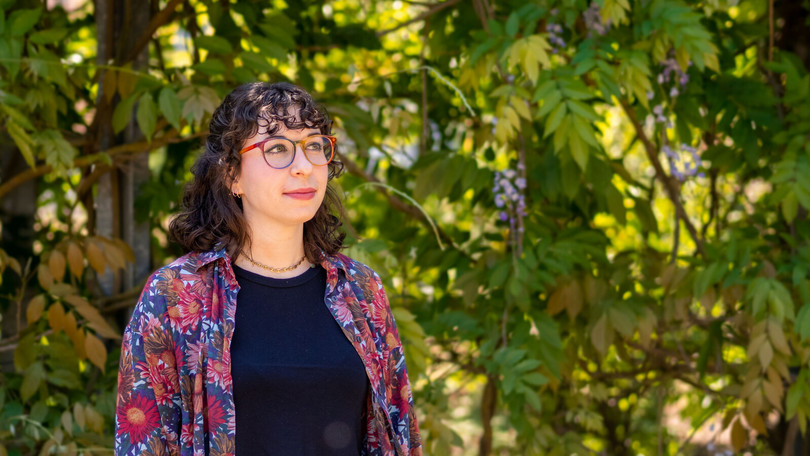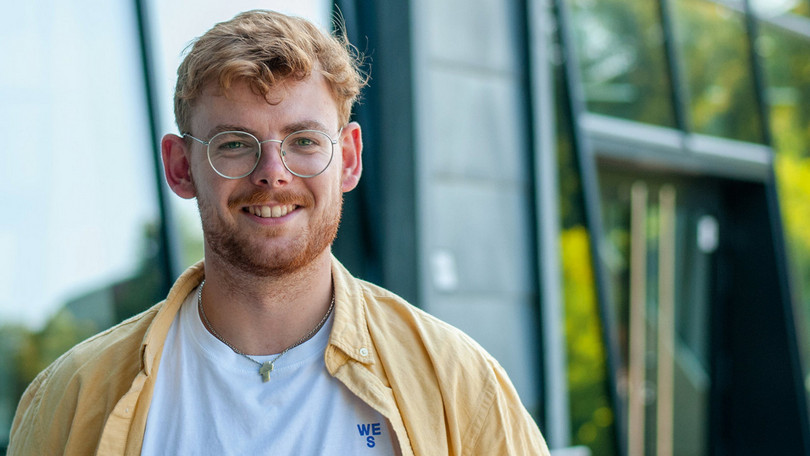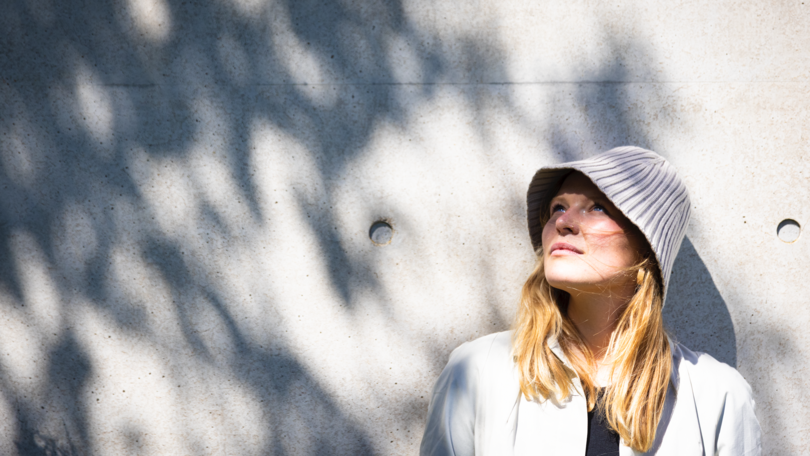Student and Alumni experiences - Cultural Studies: Culture and Organization
On this page you find experiences of current and former students about the Masters Cultural Studies: Culture and Organization at Leuphana Graduate School.
Antonina's experiences
05.12.23 After having completed their Bachelor studies in Belgrade, Antonina Kovačević chose the Cultural Studies: Culture and Organization degree programme to pursue their wish for a Masters that’s open for queer forms of expression. At the same time, Kovačević wanted their graduate studies to be critically and theoretically elaborated. They have found that Masters at Leuphana Graduate School.
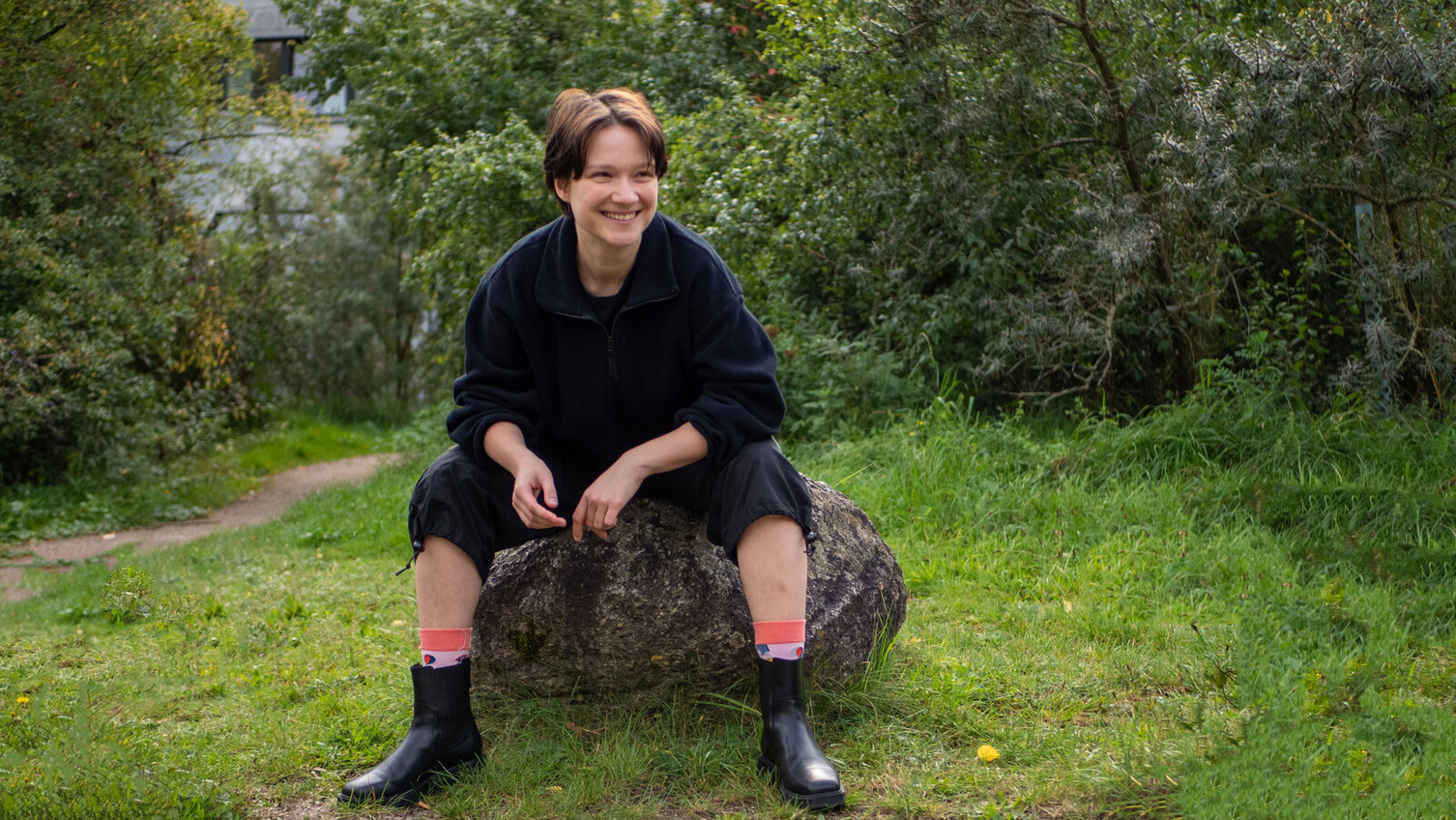 ©Ciara Charlotte Burgess/Leuphana
©Ciara Charlotte Burgess/Leuphana
Why did you choose the study programme Cultural Studies: Culture and Organization and the Leuphana Graduate School?
The main aspect that drew me to CAO and Leuphana were the English-taught courses, especially the ones about digital cultures and queer studies. For my final Bachelor project at my home university I organized a festival program about the art of drag and its inseparable ties with theatre; and even though many of my professors were very supportive, there wasn’t a systemic knowledge about queer art and culture, and my project even faced cancellation due to complaints of other departments’ professors deeming it “inappropriate”. So, when I was considering a Masters programme abroad, I knew I wanted to find a space that is not only open to various forms of expression, but brings together a wide range of cultural researchers with experience and expertise I could learn from.
What did you study before your current Masters degree and where were you able to build on this study?
Before my studies at Leuphana, I did my Bachelor in Management and Production in Theatre, Radio, and Culture at the Faculty of Dramatic Arts in Belgrade. The title is a mouthful, I know, but it basically means art production and cultural management – a very practical Bachelor programme. On the other hand, the Culture and Organization-Masters programme is rather theoretical and research-oriented. This shift definitely took some adjusting, but I feel like the two approaches complement one another; my practical experience has allowed me to understand the real-world implications of the research and concepts I am now exploring, while the theoretical input will better inform my future practical endeavours.
What are your tips for other international students when it comes to studying in Germany?
This is not related to the study programme itself but DON’T BUY NEW FURNITURE. I wish someone had told me this before I moved here. Lüneburg has such a wonderful network for exchanging second hand stuff, including clothes, furniture, and household appliances. Ask your classmates that have been living here for a while to add you to all of the Telegram groups. You won’t regret it!
The Cultural Studies Integration Modules bring together students from all Masters programmes at the Faculty of Cultural Studies. How did they experience these parts of the degree programme?
It’s interesting when, for example, students of cultural studies and business students come together to discuss management-related topics that are inherently embedded in capitalism. In classes like these we get to witness a critique-oriented perspective butt heads with a profit-oriented one, which is not something you get to encounter in everyday life. It’s almost as if there is a clash between the academic and the practical world in the classroom, and someone always walks away with some food for thought. And if not, at least it’s an entertaining debate!
Leuphana sees itself as an inter- and transdisciplinary university. The orientation of your study programme is also interdisciplinary. How do you perceive this?
In my experience the programme content has been heavily based in sociology and adjacent fields, with a sprinkle of management. Of course, as a student you can choose your own electives and complementary courses, and shape them towards a more e.g., business or sustainability path, but the core modules still mostly cover sources in different areas of the sociological study of culture. What I see as its main interdisciplinary element, however, are the students and their various academic and professional backgrounds that all come together with very different perspectives. There is no doubt that with proper communication and guidance interdisciplinary teams can come up with some unexpected results, but it is definitely a challenge for both the professors and the students to navigate the knowledge gap between, say, a marketing major from Italy and a sociology major from Hong Kong. In any case, prospective students should be prepared for lots of interdisciplinary group work and reading assignments!
What is the relationship like with other students and the lecturers?
Although group work is not my strongest suit, in many cases it forced me to connect with people I never would have met otherwise. Now, some of my closest friends are people I met in class. Even my partner used to be my classmate at Leuphana! The community of queer people and allies is truly one of the best things about studying here. The campus is full of unique and inspiring people from different parts of the world, fully expressing themselves without holding back.
And regarding the lecturers – there are some very cool people doing state-of-the-art research in cultural studies, and to many of us they are not only mentors but role models. For anyone looking to apply or already studying Culture and Organization, I would thoroughly recommend taking classes with Laura Hille, Ben Trott, Lynn Rother, and Timon Beyes.
What keeps you busy besides your studies?
While studying at Leuphana, I was fortunate enough to receive the DAAD scholarship for international students, which provided me some extra time to develop my artistic interests and connect with other creative individuals. Recently, we’ve started organizing events and producing collaborative performance pieces. This semester, I will also start working part-time as a research assistant at Leuphana’s Centre for Digital Cultures.
To whom would you recommend your Masters at Leuphana Graduate School?
I would recommend this program to anyone interested in a critical, theoretical, and research perspective on culture and organization, and especially to people looking for a more free and progressive environment to explore topics like otherness, digital spaces, or the unequal power dynamics implicated in all aspects of the world around us. As a student of Culture and Organization, you can truly research anything you want – because everything around you is culture, and it’s all organized (even when it’s organized poorly)!
Katherine's experiences
31.07.2023 After completing her Bachelor degree and working full-time in her home country, the United States, Katherine Gaul moved to Germany and to Leuphana for her Masters degree. What she particularly likes about the Culture and Organization programme is the exchange at eye level and how versatile she can apply the content of her studies.
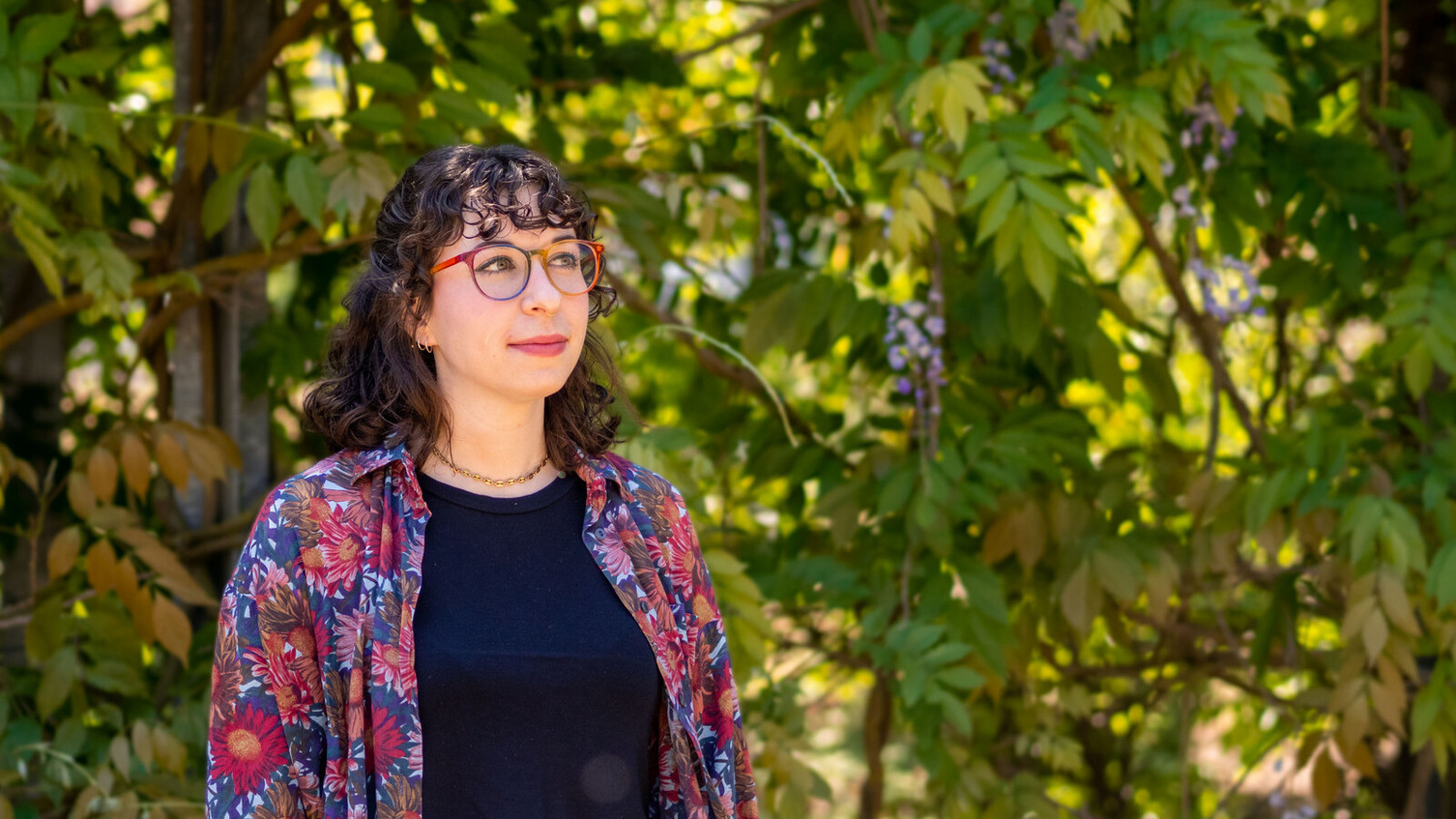 ©Ciara Charlotte Burgess/Leuphana
©Ciara Charlotte Burgess/Leuphana
Why did you choose the study programme Cultural Studies: Culture and Organization and the Leuphana Graduate School?
I chose the Culture and Organization programme because I’ve always been interested in the relationship between culture and sociology and how it shapes the world around us, but I had never had the opportunity to specifically study this academically. Therefore, studying culture in an international setting checked all the boxes for me as far as an interesting and exciting opportunity. Additionally, when I applied to the programme, I was working full-time at a large organization in the United States that was experiencing such fast growth that it was destroying the original organizational culture that had originally drawn me to want to work at that organization long term. I thought the organizational aspects of the programme would help me better examine and understand this personal experience.
What did you study before your current Masters degree and where were you able to build on this study?
I studied communication in my Bachelor studies. I have been able to build on this because communication is applicable and recognizable in many disciplines. However, the Culture and Organization programme is much more theoretical in focus than my Bachelor programme, which was much more practical and project based. So, I feel that having completed two very different degrees (in approach) will make me more well-rounded overall.
As an international student, what was the most surprising thing for you about studying in Germany at Leuphana? What are your tips for other international students when it comes to studying in Germany?
The most surprising things was the knocking on the tables at the end of class (ha!). No, really, I found it surprising how students here feel very confident/safe to speak up in their classes if something is not going correctly or if there’s a disagreement. There will be a dialogue between the professor and the students, and that’s how it should be.
My advice for incoming international students is to arrive early enough to Lüneburg to patriciate in the International Student Orientation and the intensive German classes offered as part of that orientation. I met many wonderful friends, learned a bit of German quickly, and was able to get settled before the semester really started.
As a side note: The International Student Orientation really targets short-term international students (Erasmus/study abroad), but that didn’t really matter. It was still helpful to me!
The Cultural Studies Integration Modules bring together students from all Masters programmes at the Faculty of Cultural Studies. How did they experience these parts of the degree programme?
To me, these modules didn’t feel very separate/different from the core modules, but that isn’t to say that I didn’t find them valuable. I found these modules to be very helpful in providing a good overview/background on a variety of theory that informs other parts of the programme, especially coming from a less theoretical Bachelor programme. I particularly enjoyed the ‘Current debates in the field of Cultural Studies’ module. For my cohort, the topic was restitution. I enjoyed diving deeply into one topic and really analysing all sides of this very current issue in the field.
What do you think of Lüneburg as a place to study? What should everyone do in or around Lüneburg?
I have really enjoyed living and studying in Lüneburg. It’s a very cute city that has a nice balance of having plenty of bars, shops, restaurants, and other things to do but is surrounded by nature, too. You can go swimming in the Ilmenau river or walking in the forest very easily. I brought my dog with me when I moved to Germany, and her favoriteplace is Kurpark! I would also recommend using your semester ticket to take a trip to Lübeck and then from Lübeck to Timmendorfer Strand in the summer. It’s a lovely beach!
Do you already have an idea in which direction your Masters thesis could go?
One of my academic interests include examining racism and its (terrible) implications throughout the world. I haven’t fully defined the direction of my Masters thesis, but I think this is the general direction in which I would like to contribute to.
What plans do you have after your Masters degree?
This is a difficult question to answer! I hope to remain in Germany for at least several years after graduation, so I would love nothing more than finding a job in the field of cultural studies and continuing on the path that started with my choosing this Culture and Organization programme.
To whom would you recommend your Masters programme at Leuphana Graduate School?
I recommend Culture and Organization to anyone who is interested in more deeply examining the cultural and sociological underpinnings of almost every aspect of our modern lives. This programme has helped me see and understand the world more fully, but I would say this programme is for someone who is personally or individually motivated to learn. You can get as much or as little out of this programme as you like, but that’s up to you!
Interviewer: Jonas Kernein
Lena's experiences
04.03.2022 Having already done a double Bachelor degree at Leuphana College, Lena Kostuj decided to also complete her Masters degree in Lüneburg at the Leuphana Graduate School. Now, shortly before her Masters dissertation and with a doctoral programme within reach, her expectations have been more than fulfilled.
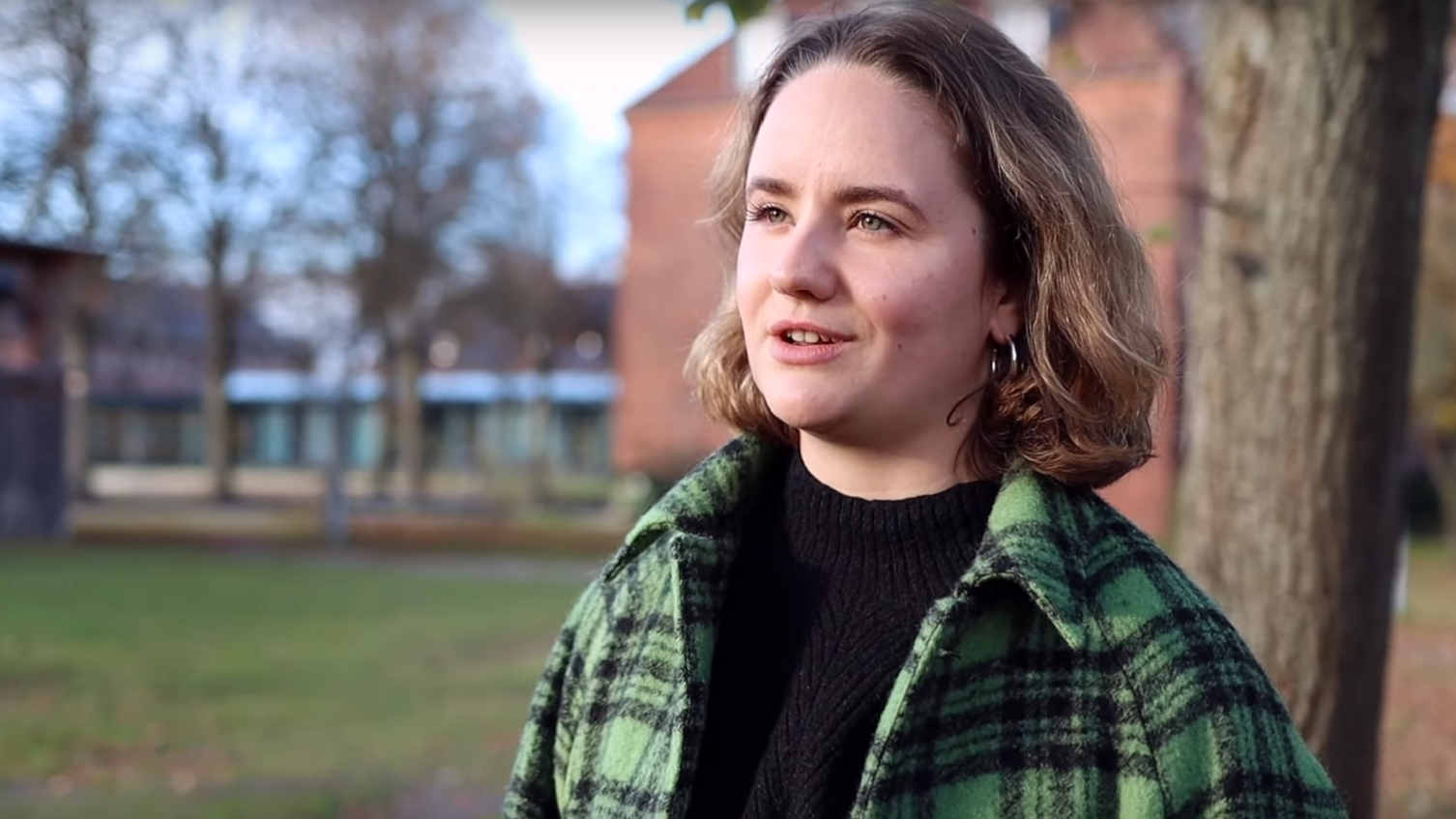 ©Leuphana Videoredaktion
©Leuphana Videoredaktion
What are your academic interests?
Since the beginning of my studies, I have been very interested in topics of cultural sociology and organizational theory. Currently, I am increasingly concerned with working conditions in the cultural and creative industries as well as the platform economy. My focus is on digital transformation processes and the resulting relations of inequality. I enjoy empirical work, especially with the help of qualitative methods.
Why did you choose the Masters programme Cultural Studies: Culture and Organization?
As I had already completed a double Bachelor degree in International Business Administration & Entrepreneurship and Cultural Studies at Leuphana, the Masters degree in Culture & Organization seemed to me to be the ideal combination of disciplines I was familiar with. The programme allows me to benefit from my previous knowledge of economics, to build on it and at the same time to take a closer look at cultural studies topics. Especially the focus on empirical work in the field of cultural sociology or regarding life and work in the cultural and creative industries offers me optimal opportunities to pursue my academic interests.
You are now in your third semester: Have your expectations of the Masters study programme been fulfilled?
Even though the start of the Masters in the midst of a pandemic did not offer the optimal starting position, my expectations have definitely been fulfilled. Despite the circumstances, I was not disappointed by the interdisciplinary orientation, the strong practical relevance and the flexibility of the programme - on the contrary.
What were you able to take away from the practical modules of the study programme?
The various collaborations with practice partners from the art scene were a great enrichment. Especially since I don't have an artistic background myself, it was very exciting to see how the different expertise and perspectives of the students in my cohort and the cooperation partners came together in the project work. The creativity and commitment with which everyone tried to achieve a common result motivated me a lot for my further studies.
How do you rate the relationship between entrepreneurial and cultural studies content in your study programme?
The programme offers a lot of flexibility to decide for yourself on the ratio of entrepreneurial and cultural studies elements, especially through the possibility of taking electives in the management field. In itself, the focus is not on entrepreneurial content, but rather on a theoretical and practical view of cultural institutions as organisations that can be very different from other companies. For me, it is questions about power relations as well as organisational theory and sociological issues that make up the programme and enable a continuous connection of cultural studies and entrepreneurial elements.
Leuphana sees itself as an inter- and transdisciplinary university. The orientation of your study programme is also interdisciplinary. How do you perceive this?
The interdisciplinary orientation of the programme was one of the reasons for my decision to continue studying at Leuphana. I perceive this orientation on the one hand in my cohort, insofar as people with very different disciplinary backgrounds work together, and on the other hand in the modules of the integrational area, electives and Complementary Studies. The exchange with students from other Masters programmes allows for exciting discussions and also gives me the opportunity to learn from my fellow students.
What keeps you busy besides your studies? Do you work alongside your studies or are you involved in voluntary work?
I currently work at the Dean's Office for Cultural Studies and for two professors at the Institute for Management and Organisation (IMO), Prof. Dr. Hannah Trittin-Ulbrich and Prof. Dr. Boukje Cnossen. While I take on administrative tasks in the area of course planning at the Dean's Office and gave a student-led tutorial for the Bachelor Conference last semester, I can gain closer insights into research work at the IMO and provide support. On a voluntary basis, I am a member of lunatic e. V., where I was especially active during my Bachelor degree.
What do you think of Lüneburg as a place to study? What should everyone have done in or around Lüneburg?
As a study city, Lüneburg has given me countless wonderful memories over the last five years. Even though I now live in Hamburg, I will definitely not miss the lunatic Festival on campus this year - and I would advise everyone else to do the same!
What plans do you have after your Masters degree?
First of all, I have an internship at a cultural institution in New York coming up in the autumn, which I'm really looking forward to. After that, I hope to start my doctoral programme, ideally at Leuphana.
To whom would you recommend the Masters Cultural Studies: Culture and Organization?
I would recommend the programme especially to people who have a desire for a future in the cultural and creative industries. Due to the strong practical orientation, the Masters study programme offers the ideal opportunity to make contacts and gain valuable experience in the field of cultural organisation. People who enjoy empirical work and interdisciplinary exchange should also feel at home in this programme.
Interviewer: Jonas Kernein
Timon's experiences
13.09.2021 The new Masters program "Culture and Organization" combines cultural studies with entrepreneurial content. In addition to his studies, the 25-year-old is involved with "Originalton Lüneburg e.V.". The student association plans to reopen Salon Hansen in downtown Lüneburg as a cultural center in the fall.
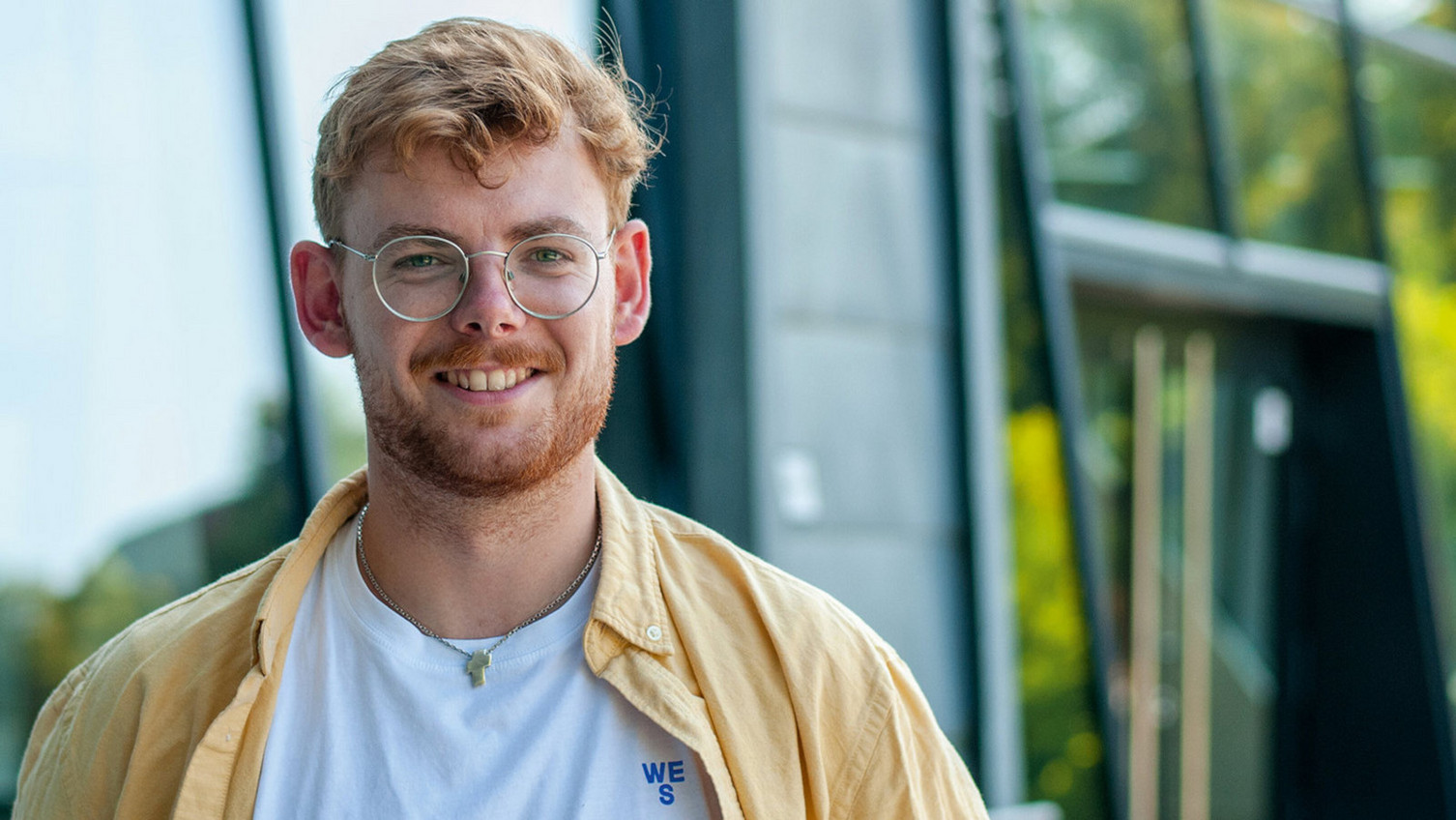 ©Leuphana/Marie Meyer
©Leuphana/Marie Meyer
After graduating from high school, Timon Scheuer applied to only one university: Leuphana. "Studying in a metropolis was out of the question for me and I had already heard a lot of positive things about the university in Lüneburg. I enjoy campus life, like networking, and like being actively involved in the city's cultural life. That works out for me here," says the student. Because of the Corona pandemic, he spent the first year of his master's degree studying online alone. The innovative Cultural Studies: Culture and Organization program is dedicated to the relationship between the arts and culture and organization. It provides an introduction to cultural theory and sociology in critical engagement with contemporary organizations and organizing. Based on these foundations, students learn to engage with organizational and entrepreneurial practices in various fields and industries in arts and culture. Timon Scheuer had heard about the new master's program during his undergraduate studies. The B.A. Cultural Studies student with a focus on cultural organization worked as a student assistant at the Institute for Sociology and Cultural Organization and followed how the new program was developed: "I already knew many of the lecturers from my bachelor's degree. That's why I was eager to continue my studies at Leuphana and deepen the field of cultural organization," recalls the master's student.
During his bachelor's studies, Timon Scheuer was already involved in the student initiative "Originalton". The volunteers there are committed to a modern and diverse cultural life in Lüneburg. Students have the opportunity to gain initial experience in cultural organization. Last year, Originalton took over Salon Hansen and is now breathing new life into the struggling club. In fall, Salon Hansen is scheduled to reopen after a long Corona break with poetry slams, concerts or readings. "That's why I'm involved with Originalton and study Culture and Organization: I want to offer creative people a stage," explains Timon Scheuer. Among other things, he is responsible for finances in the ten-member team. Originalton is now a student association and thus has better opportunities to raise funds. In return, Timon Scheuer has to deal with more bureaucracy, take care of business registration and hire a tax advisor.
For him, however, culture extends further than the pure art and culture scene. In addition to his studies, he works for a member of Hamburg's parliament: "I find cultural politics very exciting, which is why I studied the political science minor in my bachelor's degree. At Leuphana, you have the opportunity to sharpen your own profile," says the student. In the master's program "Cultural Studies: Culture and Organization," he appreciates the connection between theoretical knowledge and practical application. Most recently, for example, students worked with the Kunstverein Lüneburg to publish the cultural magazine "The Window." "Since the university is not so big, there is also good contact with the teachers and they are open to exchanges with students," Timon Scheuer reports. The master's degree in "Culture and Organization" focuses on cultural, economic, but also sustainable aspects of the cultural industry. "In very concrete terms, we are trying to implement this at Salon Hansen right now. This ranges from green electricity to D-Jane workshops to a gender-appropriate program," the student reports.
In the coming year, his cultural work in Lüneburg will take a rest. Timon Scheuer is planning a semester abroad in Poznan. He will be supported by the Friedrich Ebert Foundation.
Author: Dr. Marietta Hülsmann
Luca's experiences
13.10.2021 Luca Marie Tüshaus completed her Bachelors degree in Intermedia. What she particularly appreciates about her Masters Culture & Organization is the combination of theory and practice as well as the opportunity to come into direct contact with cultural institutions.
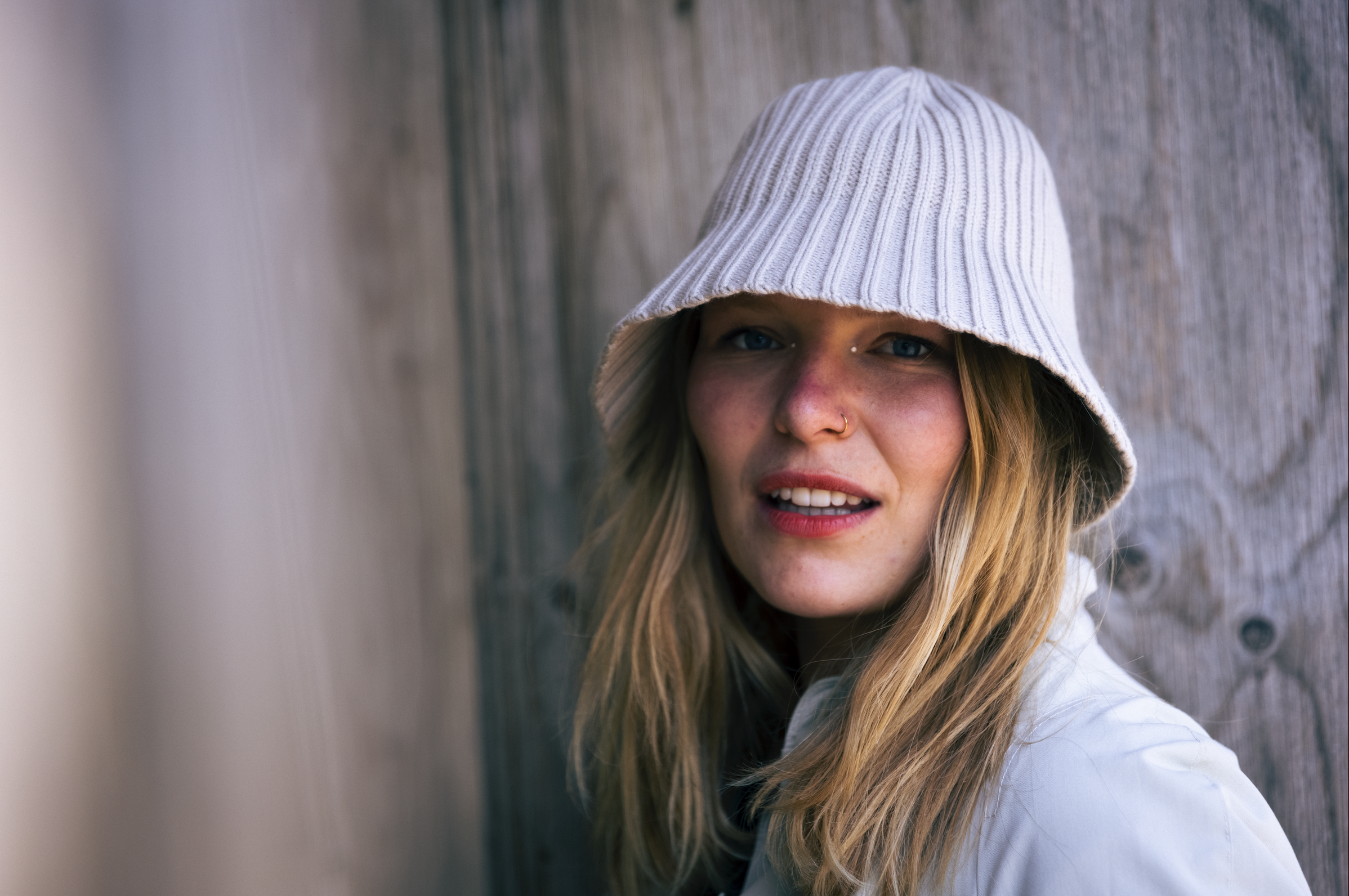 ©Privat
©Privat
What did you study before your current Masters and where were you able to build on this study?
I completed my Bachelor's degree at the University of Cologne in Intermedia with a focus on Contemporary Art & Art Theory. The Master's programme Culture and Organization allows me a broad insight into the working and organizational processes of the art and culture scene. My Bachelor's programme was more artistically-practically oriented. In the Masters, on the other hand, I can sharpen my theoretical and practical knowledge in relation to artistic processes in general and cultural organization.
Why did you choose the Culture & Organization study programme?
Already in my Bachelor's degree, I developed an increased interest in the processes and structures of cultural institutions. Especially the exchange with artists about common visions and art experiences is close to my heart. Studying the interface of art, culture and its organization, taught with an international orientation, seemed made for me. In addition to the broad theory in the department of cultural sociology and management, the programme promised cooperation with cultural institutions. There, we students could already gain experience from real practice. This practical reference and the direct contact with cultural institutions of various kinds was decisive for me in choosing the programme.
Leuphana sees itself as an inter- and transdisciplinary university. The orientation of your study programme is also interdisciplinary. How do you perceive this?
The interdisciplinary orientation of the study programme is particularly evident in the courses offered in the elective and complementary areas. While various seminars in cultural studies are offered in the elective area - from sound studies to migration and circulation to gender, body and queerness, students can expand their knowledge in other subject areas in the complementary area. I see inter- and transdisciplinarity as a great opportunity to link and condense knowledge and to create new, innovative connections.
During your studies, you have the opportunity to choose between different modules and set your own focus. Which modules did you choose and why?
My focus is on the (international) art scene, creative processes in the city, a general interest in aesthetics and the concept of atmospheres. So far, I have chosen the modules Praxisfeld Künste, Organization: Space, Aesthetics, Materiality and Urbanity and Space in the elective area. What the seminars in these modules have in common is an interest in creative processes. The question is posed from different perspectives: What role do art and culture play as triggers of social and urban processes? To what extent can art act as a mediator of socio-political issues? And what concepts (whether entrepreneurial, sociological, philosophical or aesthetic) come into play?
What is the relationship like with other students and the lecturers?
Unfortunately, I have only been able to get to know a fraction of my fellow students personally because of Corona. Nevertheless, I would say that the relationship with the other students is very close, since we are such a small programme. I also find the relationship with the lecturers very close. They always have an open ear for the interests and concerns of their students, are very committed and enable students to get involved beyond their studies and make initial contacts in the art and culture scene.
Are you active at the university alongside your studies, for example in an initiative or in university sports?
Besides my studies, I work as a student assistant for two of our professors - Prof. Timon Beyes and Prof. Volker Kirchberg. I assist Mr. Beyes in his own research, and I support Mr. Kirchberg in his teaching of our core module in the third semester Fields of Culture and the Arts. In addition, as part of the COLLECTive research project, I am investigating the working and organizational structures of Documenta GmbH and ruangrupa together with other Leuphana students. The Indonesian artists' collective ruangrupa is curating Documenta fifteen 2022 in Kassel.
What plans do you have after your Masters?
I have always been interested in international, cultural exchange – especially in the art scene. Through its interpretation and English as teaching language, the programme prepares you optimally for working and gaining experience abroad. That's why I'm going to apply for a job in the field of curation/artistic direction abroad after my studies.
To whom would you recommend this degree programme?
The programme is primarily aimed at Bachelor's graduates who have an interest in cultural and artistic processes and their organization. I would recommend this programme to people who are open, creative and communicative. Students should enjoy international exchange and working together. They should also want to realize visions and projects and think about the cultural field in a new and innovative way.
Interviewer: Jonas Kernein
Contact and Counselling
First contact point
The Information Office (Infoportal) is your contact point for
- general information on the application procedure
- initial questions about the study programmes offered at Leuphana
- making an appointment with the Graduate School Student Counselling Service.
Information Office
Building 8, Ground Level
Fon +49.4131.677-2277
studierendenservice@leuphana.de
Campus opening hours
Mon - Thu 9.00 am - 4:00 pm
Fr 9.00 am - 12 noon
Student Counselling
To make an appointment with our Student Counselling Service, please use our booking tool on our website.

